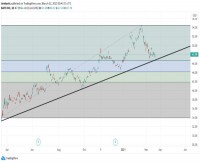|
Opalesque Industry Update - With investors focusing more on ESG investment matters than
ever before, a new study from bfinance tracks key changes in implementation practices and
identifies today's key challenges. Three key themes emerge. ESG is increasingly becoming a total-portfolio subject, with investors seeking to approach the key issues in a way that encompasses all asset classes. 'Impact' is rising up the agenda as the community moves towards thinking about ESG in terms of outcomes. Significant obstacles remain, particularly with respect to data - 84% of investors say that the lack of consistent, standardised ESG information across all asset classes and asset managers represents a challenge. The onus is now on policy-makers to deliver clearer, globally co-ordinated action. Investors' priorities are changing Far from distracting attention from the ESG agenda, the issue has remained high on the priority list through the Covid-19 era. Indeed, one in three investors say that the pandemic has actually resulted in greater attention for ESG matters at their institution, particularly in relation to social and corporate governance matters including diversity. In total, 48% of asset owners globally say that ESG considerations are now of "high importance" to their investment approach while 39% say they're of "moderate importance" - a cumulative total of 87%. European investors still prioritise the subject more than their global counterparts, with 45% of US respondents saying that ESG issues are of "minor" or "no" importance. Two key priorities have risen up the agenda dramatically in recent years: measuring carbon emissions and assessing 'impact' in areas beyond carbon emissions. 46% of investors now assess the carbon emissions associated with their overall portfolio, up from 13% three years ago, with a further third "actively considering" this step. 28% now map the portfolio against the UN Sustainable Development Goals, up from 3% three years ago, including 36% of pension funds while a further 38% are "actively considering" this point. While priorities and objectives are evolving, major challenges remain, with the data question chief among them. 84% of investors are experiencing challenges in obtaining consistent ESG reporting across asset managers and classes, with 55% calling this a "major challenge." Investors are also finding difficulties in validating the investment case for ESG or impact investing and more than 50% experience difficulties in finding external asset managers that align well with their ESG approach. Portfolios - ESG trends increasingly consistent across asset classes As ESG becomes an 'all-portfolio' issue, the findings show large proportions of investors integrate relevant factors into asset classes where they were formerly not mainstream, including 67% of Private Debt portfolios, 55% of Emerging Market Debt portfolios and 76% of Private Equity portfolios. Survey responses show asset owners using an increasingly broad mix of approaches including ESG Integration, Negative Screening, Active Engagement via asset managers, Active Engagement directly with investee companies, Impact Investing, Thematic Investing and more. There has been substantial growth in the prevalence of all of these practices within specific asset classes over the last three years. In fixed income, for example, ESG Integration has risen from 29% three years ago to 64% while negative screening has risen from 29% to 53%. Impact investment and thematic investment are still used by a minority of investors in each asset class, but their popularity has risen dramatically in the last three years: 35% of real assets investors now do thematic ESG investing, up from 15% three years ago, with a further 20% "actively considering" doing so. Investors have widely differing beliefs about the connection between ESG and performance, with 82% expecting ESG equities to outperform over the next three years (35% "strongly agree") versus 70% (17%) expecting the same in bonds. These expectations become substantially firmer over a 20-year horizon. Providers - ESG matters driving manager selection More than 90% of investors say that ESG criteria are important to them when selecting external asset managers (60% "strongly agree"), while 42% have fired at least one asset manager where ESG matters were a contributing factor to that termination (19% "the primary/major factor"). Investors also demanding more from their service providers, with 76% saying that they have "stricter" ESG criteria for manager selection than they did three years ago. Although asset owner respondents emphasise that manager ESG assessment should not be a "box-ticking exercise", an increasingly large proportion say they are "unlikely" to hire managers with certain ESG characteristics, such as not being a signatory of PRI (63% "unlikely to hire" in equities, 43% in real assets), not having a dedicated ESG headcount (43% in fixed income) or lacking gender/ethnic diversity (31% of investors in hedge funds "unlikely to hire"). Kathryn Saklatvala, Head of Investment Content for bfinance, comments: "It is a privilege to be able to share insights from such a wide range of asset owners around the globe on this crucial and timely subject. The results show the increasing breadth, depth and complexity of ESG implementation as investors look to take a more consistent, portfolio-wide, data-grounded and in many cases impact-minded approach. Yet the advancement also brings challenges: investors with increasingly clear objectives and priorities in this space are even more frustrated by the lack of clear, consistent, standardised data on many of the key issues.
|
Industry Updates
One third of institutional investors say the pandemic has increased their focus on ESG issues
Monday, February 08, 2021
|
|





 RSS
RSS








